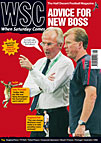 After the introduction of Wayne Rooney England fans became optimistic, but again the tournament ended in failure to convert in a shootout
After the introduction of Wayne Rooney England fans became optimistic, but again the tournament ended in failure to convert in a shootout
The editorial in WSC 233, in which we suggested that England would grind their way through the group stage then go out to the first reasonable team they played, proved to be prophetic. But we can’t claim any credit for special insight. Anyone who has followed the various tribulations of the national team over the past couple of decades knew broadly what would happen at the 2006 World Cup. So, clearly, did the England players, even down to the sudden extra effort the ten men produced in the last hour against Portugal, bidding to set up at least another of the heroic defeats to which they seem mentally attuned and which, if you ignore some obvious truths about penalty shootouts, they achieved.
One view is that if you’re taking part in a lot of shootouts it’s because you’re not doing very well at the business of actually winning matches in normal play. More telling is the language of English football when it comes to shootouts. It’s “a lottery”. It’s “totally unfair”. Anybody could end up being the villain. The idea that taking a penalty isn’t a skill and that the whole thing is governed solely by chance is a fallacy, but one consistent with English football’s historic attitudes towards skill-based aspects of the game.
Against Portugal, twice in two years, England have been distinctly second-best at passing, controlling and manipulating the ball, a shortfall in “technique” that is often made up for in energy and aerial power. Over the past month we’ve seen players from around the world who are quite happy to keep the ball for long periods of time while trying to work a goalscoring opportunity. England, though, look fundamentally ill at ease when they’ve kept the ball for longer than a few passes. Should it be any surprise that they are also second-best at kicking a ball past a goalkeeper from 12 yards?
True, two Portugal players missed the target. But Cristiano Ronaldo’s winning penalty was effortless and unsavable. This was not down to luck. It was testament to excellent basic skills, which Ronaldo clearly has in abundance – more obviously, even, than England’s much vaunted central midfielders. Calling a shootout “a lottery” denies this basic fact. The England players’ technique is weaker generally and so unsurprisingly does not match up under pressure.
The most successful coaches talk about the importance of raising your skills to such a level that the necessary movements can be repeated automatically, regardless of outside factors, thereby taking the crowd and any other pressures out of the equation. Clive Woodward in rugby union is a prime example of such a coach – look at the metronomic kicking of Jonny Wilkinson – yet the message still gets lost. When the Southampton misfit was asked his views on England’s exit, the Sun could not resist putting a headline on the piece – “Do the England players realise how much this means to fans?” – about desire, as if just wanting it more would make the difference, rather than focusing on his points about technique.
As usual, the feeling is it all goes back to nine-year-old boys being told to hoof the ball 40 yards on a full-size 11‑a‑side pitch and English crowds getting impatient (“Get rid of it!”) the moment any- body does anything to dilute the frantic pace of the domestic game. Media commentators marvelled at the fact that Argentina, one of the major footballing countries against which England might be expected to measure themselves, seem to produce an endless stream of exceptionally skilful midfielders who prove their worth in international tournaments and at the highest level for their clubs. But in England players who demonstrate abundant ball skills are seen as being untrustworthy, always required to prove that they also possess the necessary workrate. Joe Cole, the closest English equivalent to Lionel Messi et al, took a long time to win over the pundits (Wayne Rooney has never been subjected to similar caveats because he clearly doesn’t lack the most admired qualities in English football, ie strength and physical aggression, as Ricardo Carvalho was the latest to discover).
Some acknowledge this. We never thought we’d miss Trevor Brooking as a TV pundit – till we met his replacements. But the FA’s director of football development is doing more important work, trying to rebuild the English system with a strategy “specifically aimed at improving the basic skills of youngsters in the 5- to 11‑year-old age group in a fun and exciting way”. Why? “The harsh fact is that many clubs feel our teenage hopefuls are significantly behind the technical skills embedded in their counterparts [from countries] like France, Spain or Portugal. We have some major catching-up to do to rectify this.”
Other problems played their part in the latest England failure. There were some baffling team selections and formations after some gambles in the balance of the squad that failed to come off or, in the case of Theo Walcott, Sven-Göran Eriksson was reluctant to try. The coach then found himself in an endgame in which it was impossible to place the burden on a 17-year-old. But if Brooking has success in the next few years, then maybe sending out a bunch of technically adept teenagers for a shootout in 2014 will be England’s best chance of success.
From WSC 234 August 2006. What was happening this month